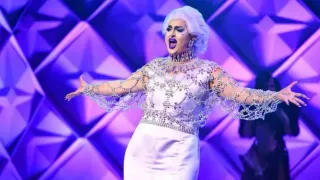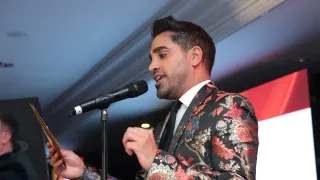
5 hours ago
Alex Thomas-Smith Felt “Fully at Home” In Dunham's ‘Too Much’
READ TIME: 3 MIN.
When Alex Thomas-Smith joined the cast of Lena Dunham’s latest Netflix series Too Much, they stepped onto set with the hope—but not the expectation—of being embraced for their full identity. For many LGBTQ+ actors, particularly those who are trans or non-binary, entering a new production can come with apprehension about acceptance behind the scenes. Yet, as Thomas-Smith told PinkNews, their experience on Too Much was affirming from the start: “I never felt out of place” .
The series, released on July 10, 2025, follows Jessica (Megan Stalter) as she relocates from New York to London, embarking on a journey of self-discovery and new relationships. Thomas-Smith portrays Jetta, the queer cousin of Felix (Will Sharpe)’s friend, bringing a trans femme non-binary perspective to the ensemble . For Thomas-Smith, this wasn’t just another role—it was a space where their authentic self was not just tolerated but valued.
A significant moment for Thomas-Smith came when Dunham herself paused filming to connect personally. “Lena pulled me to one side one day, and we stopped filming for 20 minutes while she told me about her wonderful experiences and I poured out my heart to her a little bit. She was so gracious,” Thomas-Smith recounted . This gesture, they noted, set the tone for an environment where openness and vulnerability were encouraged, not just in front of the camera but behind it as well.
The warmth and intentionality that Thomas-Smith describes are still far from the norm across the industry. In an interview with Attitude last month, they highlighted how their lived experience as a trans femme non-binary person brings depth and authenticity to the characters they play—something that cannot be taught or fabricated . Too Much provided a rare opportunity to showcase that truth in a major streaming series.
Representation in mainstream media remains a pressing issue for LGBTQ+ communities, especially for transgender and non-binary people. According to a recent GLAAD report, trans character visibility on television actually declined for the second consecutive year, highlighting the significance of Thomas-Smith’s role in Too Much . By casting Thomas-Smith in a role that neither tokenizes nor marginalizes, the show offers a model for meaningful inclusion.
Thomas-Smith’s character, Jetta, is integral to the narrative, particularly during a pivotal wedding reception scene that allows the actor to step into the spotlight . Their presence is not an afterthought but a crucial part of the story’s emotional core. This kind of representation matters: it gives LGBTQ+ viewers, especially trans and non-binary people, the chance to see themselves reflected in stories that are complex, joyful, and deeply human.
Too Much arrives at a time when the entertainment industry is grappling with how to move beyond surface-level diversity. While the show has generated buzz for its “chaotic brilliance” and unflinching portrayal of millennial angst, it’s the quiet acts of inclusion behind the scenes that may have the most lasting impact .
For queer viewers, especially those navigating their own journeys of self-acceptance, Thomas-Smith’s story is more than just a behind-the-scenes anecdote—it’s a beacon. It demonstrates what is possible when productions prioritize not only LGBTQ+ talent but their wellbeing and sense of belonging.
As Thomas-Smith continues to break ground with roles in both Too Much and previous projects like What It Feels Like for a Girl, their visibility signals a shift toward richer, more authentic queer storytelling in popular culture . With Too Much now streaming on Netflix, audiences have a new example of what it looks like when LGBTQ+ actors are trusted to bring their full selves to their work—and are celebrated for it.






